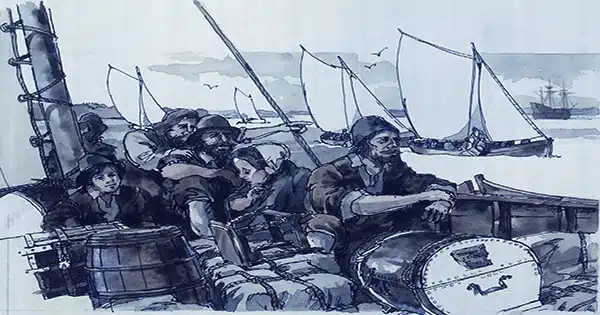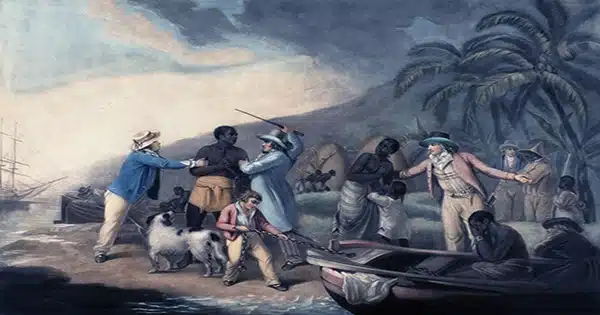The English ambassadors John Merrick and William Russell arrived in the Russian northwestern port city of Archangel in 1613. The initial goal of their quest was very harmless. The two individuals were given formal orders to protect the financial situation of the Muscovy Company, which was the principal business institution that regulated commerce with Russia at the period. They also had a covert goal: to investigate the prospect of annexing a portion of northern Russia and establishing an English colony in Muscovy. It was envisioned that this colony would extend all the way down the Volga River to the Russian border with Persia.
This audacious attempt at ‘land-grab’ in northern Russia was unique in and of itself. What made it even more noteworthy was the fact that the plan was supported by a number of London-based organizations. Members of the English Royal Navy, mercenary soldiers, top courtiers, the king, and, of course, the Muscovy Company were among them.
England’s plans to colonize Russia arose during a moment of political upheaval. In 1605, the first false Dimitri – an imposter posing as Ivan the Terrible’s youngest son – led an uprising against the then-Muscovite ruler, Boris Godunov. This is widely regarded as the beginning of Russia’s Time of Troubles (1605-13), a time of political strife in which multiple alternative claimants to the Russian throne existed. This decade-long conflict culminated in the near-total destruction of Russia’s economic, social, and political structures. Because of the lack of central control, Poland and Sweden launched assaults into Muscovy between 1610 and 1612. Against this backdrop, Thomas Chamberlain, an English mercenary soldier, and other military men conceived and developed the notion of an English invasion of Russia.

Initially, their approach was slightly out of left field. However, by 1612, the concept had begun to gain traction. The Muscovy Company and its governor, Thomas Smythe, one of England’s most successful merchants, saw evident promise in the proposition: establishing a colony in Russia would not only protect their trade but also offer a faster and shorter trading route overland to India. By 1613, key courtiers such as the Earl of Pembroke, the Lord Chancellor, and even King James I had backed the notion of an English colony in Russia.
Smythe undoubtedly backed the initiative to establish a colony in Muscovy. In an undated document written by Thomas Chamberlain, believed to have been written around the winter of 1612-13, Chamberlain stated that he ‘had a conference with Sir Thomas Smythe, governor of the Muscovy Company, [who] had been ambassador there (a man very painful and industrious in all public service)’. Smythe and his merchant colleagues, according to Chamberlain, had ‘entered into consideration of a scheme which, if embraced, may be profitable to his majesty and the whole kingdom’ – the plot to invade Russia. Smythe’s motivation for promoting the project, however, may have gone beyond his link with the Muscovy Company.
The Muscovy and East India Company had sponsored missions to discover a Northwest Passage under Smythe’s management in the first decade of the 17th century. It was thought that such a route would allow travelers to proceed north, eventually reaching China, India, and Central Asia. This had the potential to cut months off the traditional commercial route from Africa to the Far East and India via the Cape of Good Hope. In 1607, 1608, and 1610, the businesses also funded the English explorer Henry Hudson’s attempts to show the existence of a Northwest Passage. None of these missions made any tangible progress toward establishing the legendary road.
Smythe’s belief in the availability of a faster economic route to the East was unaffected by these setbacks. Smythe and his cousin Dudley Digges founded the North-West Passage Company in July 1612. The original patent of the Company demonstrates that it was widely supported by the business community; it was comprised of various merchants who had previously worked closely with Smythe. Benjamin Decrow (a senior member of the Muscovy Company) and English ambassadors John Merrick and William Russell were among them. However, the new commercial entity was a flop. This was due in part to one of its key sponsors, Digges, publishing a book about the Northwest Passage called Of the Circumference of the Earth in 1612, which was riddled with mathematical and navigational errors. Unsurprisingly, the effort was highly criticized, and Digges’ failings further tarnished the North-West Passage Company as a legitimate institution.
Smythe’s participation in the attempt to colonize Russia must be weighed against this series of failures. The misfortune of these expeditions to discover a Northwest Passage by sea, all of which Smythe was a part of, may have led him to throw his full weight behind the more extreme plan to annex a portion of Russia in the winter of 1612-13, which could have provided him with his desired passage to the East, this time by land.
England’s colonization strategy failed miserably. Merrick and Russell arrived in Muscovy in 1613 to learn that Russia had elected a new emperor, Michael I. Military annexation is now impossible. Merrick, who was politically astute, simply submitted his credentials to the new tsar and requested that the Muscovy Company’s former trading privileges be renewed. The anticipated English invasion of Russia never happened.














